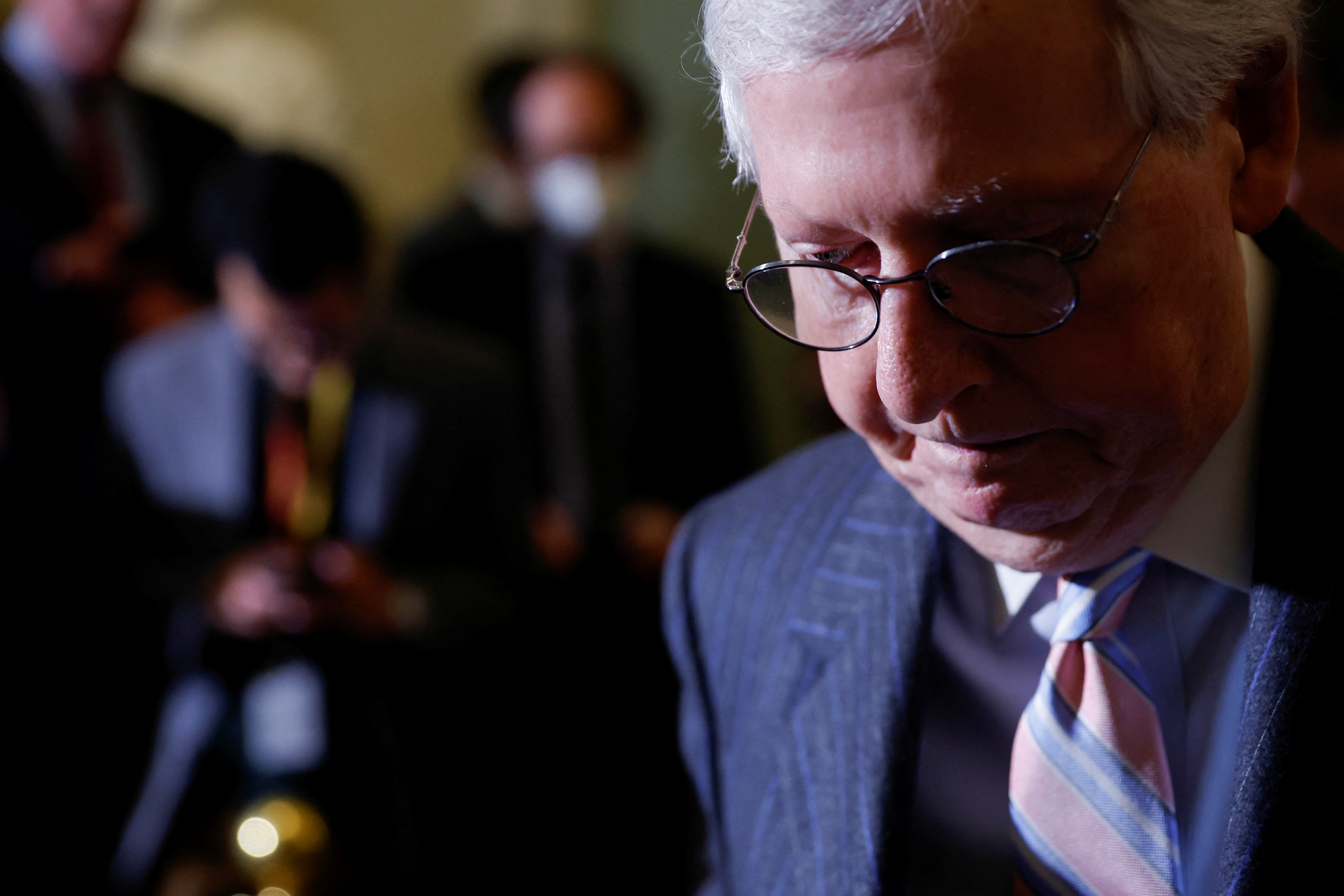
Mitch McConnell to end 17-year tenure as top US Senate Republican
PHOTO CAPTION: U.S. Senate Minority Leader Mitch McConnell (R-KY) speaks to reporters after the weekly Senate party caucus policy luncheons at the U.S. Capitol in Washington, U.S. March 22, 2022. REUTERS/Jonathan Ernst
By Richard Cowan and David Morgan
WASHINGTON (Reuters) -U.S. Senate Republican leader Mitch McConnell said on Wednesday he will step down from his leadership role, leaving a power vacuum atop the party he has piloted for nearly 17 years, more than any other party leader in the chamber's history.
"I turned 82 last week. The end of my contributions are closer than I prefer," McConnell said on the Senate floor, his voice breaking with emotion. "Father Time remains undefeated. I'm no longer the young man sitting in the back hoping colleagues remember my name. It's time for the next generation of leadership."
The 82-year-old Kentucky lawmaker played an outsized role in helping former President Donald Trump cement a 6-3 conservative majority in the Supreme Court, paving the way for landmark rulings cheered by conservatives ending the recognition of a constitutional right to abortion and expanding gun rights.
That belied McConnell's personal opposition to Trump at times - particularly Trump's conduct ahead of the Jan. 6, 2021, attack on the U.S. Capitol - as well as McConnell's continued vocal support for trying to pass aid to Ukraine in its fight against a Russian invasion over the opposition of hardline Republican opponents.
Democrats hold a slim majority in the Senate, with McConnell now serving as minority leader after previously holding the post of majority leader. McConnell said he will not run for Senate Republican leader in November's party elections, meaning he will end his time as leader when a new Congress convenes in January.
McConnell's departure from the leadership will remove a central character in negotiations with Democrats and the White House on spending deals to keep the federal government funded and avert a shutdown. His steady command of his caucus stood in contrast to relatively newly minted Republican House of Representatives Speaker Mike Johnson, who has struggled to lead his thin majority.
McConnell twice last summer froze up while making remarks in public, raising questions about his ability to continue to carry out the duties of his high-powered job. Those concerns were not assuaged by an Aug. 31 note from the congressional physician that cleared McConnell to go on working.
He indicated that he plans to serve out the rest of his term in the Senate, which extends through January 2027. But his exit from the leadership will mark the step back of an orderly counterpart to the tumultuous approach of Donald Trump, the frontrunner for the Republican nomination to challenge Democratic President Joe Biden, and the hardline House Freedom Caucus ahead of the Nov. 5 U.S. election for president, the full House and a third of the Senate.
Now with Republicans having to elect a new party leader, conservative pressure to hang tough against a moderate spending deal with Democrats could weigh more heavily on the budget negotiations and the leadership election.
McConnell announced his plans on the Senate floor the morning after Trump won the Michigan Republican primary, continuing his sweep toward the party's nomination.
"I think the Trump chapter reopening is his cue to exit stage left," a former high-ranking Senate Republican aide said when asked about the timing of McConnell's move.
MCCONNELL ALIENATES TRUMP
McConnell lashed out at the twice-impeached Trump for falsely claiming that widespread fraud cost him the 2020 election, the theme of the then-president's speech on Jan. 6, 2021, shortly before his followers stormed the U.S. Capitol.
The Senate leader had voted to acquit Trump of having incited an insurrection but alienated him in a Senate speech by asserting that he was "practically and morally responsible" for the Capitol riot.
"American citizens attacked their own government," McConnell said at the time. "They did this because they had been fed wild falsehoods by the most powerful man on Earth - because he was angry he'd lost an election."
McConnell's hardball approach to governing was on display in early 2016 when he orchestrated Republican stonewalling of then-President Barack Obama's nomination of Merrick Garland to a vacant seat on the U.S. Supreme Court.
He argued that it was too close to the presidential election that November and that voters should be left to decide the high court's direction in casting their votes for president.
Without missing a beat, McConnell struck again in 2020, this time just weeks before another presidential election. Taking the opposite approach, he rammed through then-President Trump's nomination of Amy Coney Barrett to the Supreme Court, cementing a 6-3 conservative majority.
He gleefully embraced the nickname "Grim Reaper" for his willingness to stonewall Democratic goals.
Senators John Thune the No. 2 Senate Republican, John Cornyn and John Barrasso were expected to vie for the top party job. It was unclear what other senators might jump into the race.
(Reporting by Richard Cowan and David Morgan, additional reporting by Katharine Jackson and Doina Chiacu; Editing by Will Dunham, Scott Malone and Howard Goller)









